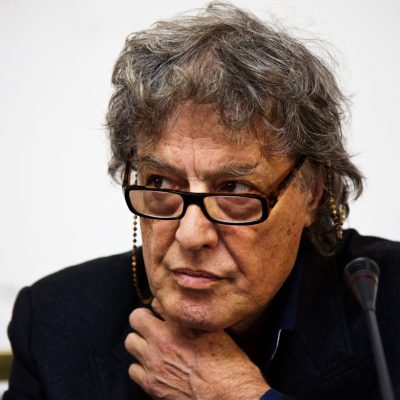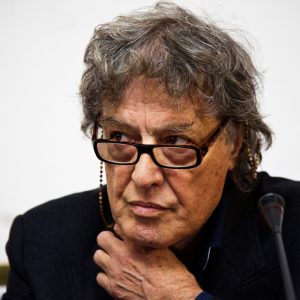27 Feb 2025 | Europe and Central Asia, News and features, Russia
“Dear Alexei, it’s been a year that darkness has fallen upon us – and yet, your ideas and your determination give us strength,” read a letter placed on opposition leader Alexei Navalny’s grave on 16 February 2025, marking the one-year anniversary of his death.
That day, more than 5,300 people attended the Borisovskoye Cemetery in Moscow where he is buried, according to the Beliy Schetchik (White Counter) movement. Despite temperatures reportedly dropping to a frosty -8 degrees Celsius, Navalny supporters waited in line outside the cemetery to pay their respects.
Artist and musician Yaroslav Smolev was one of the attendees. He told Index: “By joining in, not only did we get a chance to feel that we’re among like-minded people, but we also showed the [rest of the] Russian society what matters to us.”
In the days following Navalny’s death last year, Smolev spoke to Index for the first time. He had been arrested for staging a solo protest in support of the opposition leader in the centre of St Petersburg. Around that time, hundreds of mourners were being detained across the country, namely for laying flowers at improvised memorials.
Even so, people have returned to these locations this year to honour Navalny’s memory – and were predictably punished. According to the rights group OVD-Info, on the anniversary of Navalny’s death, at least 26 people were detained. In the city of Volgograd, for example, Alexander Yefimov from the Yabloko opposition party was jailed for 14 days for bringing flowers and a photo of Navalny to a memorial and placing them at a monument dedicated to victims of Soviet-era repression.
Carrying portraits of Putin’s main opponent – and even signs with his name on – became illegal after Navalny and his movement were declared “extremist” in 2021 and 2022.
For Smolev, Navalny is a role model who enabled him to overcome his fears. “He spoke with police officers in a natural and straightforward manner,” Smolev said. “There was not even a hint of fear in his behavior.” Smolev stressed that if it weren’t for Navalny, he would have never joined many peaceful protests, starting in 2017.
He added that if Navalny hadn’t gone as far as sacrificing his life “for his values and his ideals”, “the general public might not have realised that his lifelong battle was, in fact, heartfelt”. He was alluding to Navalny’s return to Russia in 2021 from Germany after recovering from a poisoning he blamed on the Kremlin.
For Nadezhda Skochilenko – the mother of former Russian political prisoner and Index award winner Aleksandra Skochilenko – Navalny’s death caused “much pain”. Above all, she told Index, she thinks of him as “the son of his mother”, Lyudmila Navalnaya.
When Navalny died, Aleksandra was in jail. She had been sentenced to seven years in a penal colony for replacing supermarket pricing labels with anti-war messages. She was ultimately released as part of a prisoner exchange last summer.
Asked if the news of Navalny’s death increased her fear for the safety of political prisoners like her daughter, Nadezhda responded: “I’m too well-informed about what’s going on [in Russian] prisons. I’m frightened for everyone [who’s incarcerated] from the moment they’re arrested.”
She said that people die in jails, in pre-trial detention, and even during arrest. In 2024, eight political prisoners perished; one of them was pianist Pavel Kushnir, who spoke out against the Russian invasion of Ukraine.
Over the past year, the pressure on political prisoners has increased, Nadezhda said. They are placed in solitary confinement “more frequently and for longer periods of time”. In these tiny punishment cells, people are not allowed to lie down during the day, among other restrictions.
To make matters worse, in many cases, proper medical treatment is not provided to political prisoners – a fact that “the authorities no longer try to conceal”, Nadezhda said. She is also concerned that minors accused of “terrorism” in politically-motivated cases are placed in pre-trial detention, instead of on house arrest.
She added that “on a regular basis” dissidents are denied access to letters sent by their supporters. Nevertheless, people keep writing to them – “the most useful and safest act [of resistance] within reach of everyone”, according to Smolev.
Despite the pressure of the authorities, supporters and families of jailed dissidents battle with prison administrations over human rights abuses. They also attend court hearings when they can – while some are still open to the public, many political trials are now closed, especially the ones of dissidents charged with treason, Nadezhda explained.
But acts of resistance “cannot be entirely suppressed”, she said – “hence “[Putin’s] regime responds with even more severe crackdown on dissent”.
16 Feb 2024 | News and features, Russia
When Alexei Navalny returned to Russia after the Kremlin had him poisoned with novichok, he took a bet that Vladimir Putin would not dare to kill the man who was on the blackest of black lists. Today Navalny lost that bet.
I met Navalny twice, once in Strasbourg and once in Moscow, and had had a long Zoom conversation with him. He was a truly extraordinary man: impossibly brave, charismatic, pig-headed, funny, great. To me, he symbolised the idea of a Russia without fascism, free and democratic. Von Stauffenberg dared to try to kill Hitler but he also did something else, he kept the idea of another Germany alive in 1944. Navalny dared to stand up to Putin and kept the idea of another Russia alive in 2024.
He could be extremely annoying. The first time we met was at the European Court of Human Rights in Strasbourg where his lawyers were suing Russia from stopping him standing against Putin. Hearing concluded, he had ten minutes to talk to me for a BBC Panorama we were making about him called Taking On Putin. Cameraman Seamas McCracken was fixing mikes on lapels when I explained that Seamas was from Northern Ireland. Seamas stopped work. Navalny was greatly amused as precious seconds slipped away while I apologised and said that Seamas was from the north of Ireland. Only when Seamas was happy did the interview happen. But what sticks in the mind was not my Irish pal sticking up for his rights but Navalny’s amusement at my difficulty.
In Moscow, he and his supporters were under continuing attack. One of his team had been hit over the head with an iron bar, another beaten black and blue by silent thugs. And yet what you got was the real thing: sardonic, amused Navalny, punching words out at the little man in the Kremlin. Is Russia a police state?, I asked him. “Absolutely,” he replied.
He started out as a lawyer representing clients who had been wronged by Russia’s corruption engine. For a time around 2008, he dallied with the far-right, calling Chechens “cockroaches” and, later, upsetting Ukrainians by saying that Crimea is Russian. It is Ukrainian. But then he dumped that dark nonsense and set out the case for a liberal, democratic Russia.
His big moment came in 2012 when Putin switched his patsy, Dmitry Medvedev, out of the Kremlin so he could get back in again and another Russia hit the streets in their hundreds of thousands. Charismatic, funny, bitter, Navalny called Putin’s political vehicle “The Party of Crooks and Thieves” and he became a kind of rock star. One time, the police arrested him, twisting his arm behind his back so he howled in pain, before locking him in a police van. That video was seen millions of times.
Navalny got going, making brilliant videos detailing corruption in Russia. Two stand out: Putin’s Palace, which got more than a hundred million views on YouTube, setting out in fine details how his oligarchs paid for a naff palace by the Black Sea with golden toilet roll holders, and a second on his poisoning. In it, Navalny had the balls to pretend being a Kremlin high-up and called one of the poisoners. The hapless goon coughed up to the mechanism of assassination, that they lined the seams of his underpants with novichok.
He went back to Russia daring Putin to murder him. A show-trial followed, the only thing that was real was the moment when Navalny, from his glass-walled dock, cradled his hands into the shape of a heart for his wife, Yulia.
I hope that Russia will wake up from its zombie state, that Navalny will get his revenge from beyond the grave but I doubt it. Still, he lost his life standing up for another Russia and his memory will shine in history.
Farewell, my fond and foolish friend.
16 Feb 2024 | Belarus, News and features, Nicaragua, Opinion, Russia, Ruth's blog, United States
This week marked another Valentine’s Day and the world was abuzz with expressions of love and affection. Yet, amidst the sea of roses and chocolates, there lies a stark reality for many: the agony of separation from loved ones. For dissidents around the globe, this pain is not merely a matter of distance; it is the consequence of standing against tyranny - for speaking truth to power.
As CEO of Index on Censorship, I have witnessed the bravery of individuals who dare to challenge oppression, knowing full well the risks they face. We need to remember this every day - but this week, Valentine's week, there is a responsibility on all of us to recognise their sacrifice and the profound commitment that drives them to advocate for change and to continue their struggle against tyrants - in spite of the personal cost for them and their loved ones.
One example is Russian activist and thorn-in-Putin's-side Alexei Navalny, whose death in a penal colony has been reported today. In 2020, Navalny fell into a coma after suspected poisoning with the nerve agent novichok and was taken to Germany for treatment. The poisoning was widely believed to have been ordered by Putin and suspicion about his death has immediately turned to the Russian president.
To the surprise of many, in 2021 Navalny returned to Russia with his wife, Yulia Navalnaya. He was immediately arrested on a variety of trumped-up charges. At the time of his death, he was serving a 19-year sentence. Navalny and his wife have been apart ever since their return to Russia, with her husband sent to a series of penal colonies, each more hideous than the last. Appearing at the 2023 Oscars when the Navalny documentary about her husband won the best documentary award, Navalnaya said in an emotional speech "Alexei, I’m dreaming of the day when you will be free and our country will be free. Stay strong, my love."
Love was what sustained them during their enforced separation. In what turned out to be
his last post on Instagram, Navalny wrote: "Babe, we have everything like in a song: cities between us, airport runway lights, blue blizzards and thousands of kilometres. But I feel you are near me every second, and I love you more and more ❤️".
Another example is Andrei Aliaksandrau and his partner Irina Zlobina. Andrei, a former member of the Index team and a Belarusian journalist and human rights defender, has dedicated his life to exposing the truth and holding those in power accountable. However, his commitment to freedom of expression has come at a personal great cost. In November 2020, Andrei was arrested by Belarusian authorities in a crackdown on dissent following the disputed presidential election. Since then, he has been detained, facing trumped-up charges and enduring harsh conditions behind bars.
Irina too was arrested and sentenced on similar charges. Now they find themselves separated by Lukashenka in different prisons in Belarus.
For Andrei and Irina, Valentine's Day serves as a painful reminder of their separation. While the world celebrates love, they are forced to endure the anguish of being torn apart by injustice.
These are just two examples among thousands of others. A reminder that there are many different manifestations of love is Tamara Davila, whose heartbreaking ordeal underscores the intersection of love and dissent in the face of authoritarian oppression. Deported from Nicaragua to the United States for daring to speak out against the government, Tamara's enforced separation from her daughter and wider family serves as a chilling example of how the Nicaraguan authorities wield love as a weapon against dissenters. Despite the government's attempts to silence her, Tamara's enduring love for her family fuels her resolve to continue fighting for justice and freedom, demonstrating the profound power of love in the face of adversity. Her story serves as a stark reminder that even in the darkest of times, love remains an unyielding force that empowers individuals to stand up for what is right, no matter the cost.
These stories encapsulate the intersection of love and dissent—a powerful force that transcends borders and inspires change. Despite the physical distance separating dissidents and their partners and families, their love fuels their resilience, reminding us all of the inherent connection between personal relationships and the broader struggle for human rights.
This Valentine's week, let us honour the courage of individuals like Alexei and Yulia, Andrei and Irina, and Tamara and her daughter by amplifying their voices and demanding justice. Let us stand in solidarity with all those who sacrifice their freedom for the sake of truth and justice. And let us never forget that love, in all its forms, has the power to overcome even the most formidable obstacles.
In the spirit of Valentine's Day, let us reaffirm our commitment to love and dissent, recognising that they are not mutually exclusive but rather intertwined in the fight for a more just and free world.





